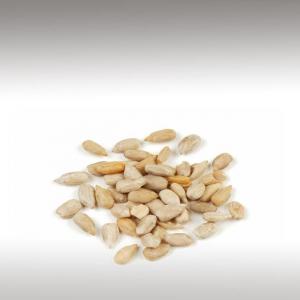
SUNFLOWER OIL (HELIANTHUS ANNUUS) - BASE OILS

BASE / GENERAL DATA
Information submited: March 28, 2014 Modified: May 9, 2018 By: OperaDreamhouse
Sunflower has been cultivated by Native Americans for centuries. They used the plant for dietary, medicinal, and decorative purposes. Helianthus Annuus Seed oil is the oil expressed from the seeds of the Sunflower, Helianthus Annuus, Compositae.
Sunflower seed oil comes from Sunflower seeds. The Sunflower is extracted using a cold press expeller method, which is essentially squeezing raw materials under high pressure until all the oily goodness is squished out.
Sunflower oil was first industrially produced in 1835 in the Russian Empire. The world's largest Sunflower oil producers now are Ukraine, Russia and Argentina.
It is a relatively lightweight oil that is best obtained through the cold press processing of Sunflower seeds.
Chemical structure:
Sunflower oil is light in taste and appearance and supplies more Vitamin E than any other vegetable oil. It is a combination of monounsaturated and polyunsaturated fats with low saturated fatlevels. The oil contains appreciable quantities of Vitamin E, sterols, Squalene, and other aliphatic hydrocarbons, terpene andmethyl ketones (chiefly methyl nonyl ketone).
Sunflower oil is a monounsaturated / polyunsaturated mixture of mostly oleic acid (omega - 9), linoleic acid (omega-6) group of oils. The oil content of the seed ranges from 22 to 36% (average, 28%): the kernel contains 45 - 55% oil.
Sunflower oil also contains lecithin, tocopherols, carotenoids and waxes. Sunflower oil's properties are typical of a vegetable triglyceride oil. Sunflower oil is produced from oil type Sunflower seeds. Sunflower oil is light in taste and appearance.
Palmitic acid (saturated): 5%
Stearic acid (saturated): 6%
Oleic acid (monounsaturated omega - 9): 30%
Linoleic acid (polyunsaturated omega - 6): 59%
Sunflower seed oil comes from Sunflower seeds. The Sunflower is extracted using a cold press expeller method, which is essentially squeezing raw materials under high pressure until all the oily goodness is squished out.
Sunflower oil was first industrially produced in 1835 in the Russian Empire. The world's largest Sunflower oil producers now are Ukraine, Russia and Argentina.
It is a relatively lightweight oil that is best obtained through the cold press processing of Sunflower seeds.
Chemical structure:
Sunflower oil is light in taste and appearance and supplies more Vitamin E than any other vegetable oil. It is a combination of monounsaturated and polyunsaturated fats with low saturated fatlevels. The oil contains appreciable quantities of Vitamin E, sterols, Squalene, and other aliphatic hydrocarbons, terpene andmethyl ketones (chiefly methyl nonyl ketone).
Sunflower oil is a monounsaturated / polyunsaturated mixture of mostly oleic acid (omega - 9), linoleic acid (omega-6) group of oils. The oil content of the seed ranges from 22 to 36% (average, 28%): the kernel contains 45 - 55% oil.
Sunflower oil also contains lecithin, tocopherols, carotenoids and waxes. Sunflower oil's properties are typical of a vegetable triglyceride oil. Sunflower oil is produced from oil type Sunflower seeds. Sunflower oil is light in taste and appearance.
Palmitic acid (saturated): 5%
Stearic acid (saturated): 6%
Oleic acid (monounsaturated omega - 9): 30%
Linoleic acid (polyunsaturated omega - 6): 59%

SPIRITUAL PRACTISES DATA

MEDICINE / HEALTH DATA
Information submited: May 21, 2014 Modified: May 9, 2018 By: OperaDreamhouse
Sunflower oil has many medicinal and cosmetic uses and may be helpful if you are suffering from acne, eczema, inflammation, general redness and irritation of the skin.
Sunflower oil has been used historically as a topical anti-inflammatory and pain reliever, and it is taken by mouth to relieve constipation and ulcers and to treat infection. Sunflower oil is high in Vitamins A, C and D, all of which have protective qualities. It's also a great product to use on newborn baby for extra skin protection.
Sunflower oil research:
Limited research suggests that Sunflower oil may not affect the levels of two markers of inflammation in breast milk, interleukin-8 (IL-8) and transforming growth factor-beta (TGF-beta).
Limited research suggests that Sunflower oil may help reduce blood levels of cholesterol.
Research suggests that Sunflower oil may not have an effect on blood pressure in patients diagnosed with high blood pressure.
At this time, it appears that Sunflower oil may not increase the level of Vitamin A in blood or breast milk of pregnant or breastfeeding women
Sunflower oil is often used as a placebo in clinical trials examining the effect of other oils.
Side effects:
Sunflower oil may lower blood sugar levels. Caution is advised in patients with diabetes or hypoglycemia and in those taking drugs, herbs, or supplements that affect blood sugar. Blood glucose levels may need to be monitored by a qualified healthcare professional, including a pharmacist. Medication adjustments may be necessary.
Use cautiously in obese individuals, as clinical studies have reported conflicting findings concerning Sunflower oil's effect on body weight.
Avoid with known allergy or hypersensitivity to Helianthus Annuus, it constituents, or other members of the Asteraceae family.
Sunflower oil has been used historically as a topical anti-inflammatory and pain reliever, and it is taken by mouth to relieve constipation and ulcers and to treat infection. Sunflower oil is high in Vitamins A, C and D, all of which have protective qualities. It's also a great product to use on newborn baby for extra skin protection.
Sunflower oil research:
Limited research suggests that Sunflower oil may not affect the levels of two markers of inflammation in breast milk, interleukin-8 (IL-8) and transforming growth factor-beta (TGF-beta).
Limited research suggests that Sunflower oil may help reduce blood levels of cholesterol.
Research suggests that Sunflower oil may not have an effect on blood pressure in patients diagnosed with high blood pressure.
At this time, it appears that Sunflower oil may not increase the level of Vitamin A in blood or breast milk of pregnant or breastfeeding women
Sunflower oil is often used as a placebo in clinical trials examining the effect of other oils.
Side effects:
Sunflower oil may lower blood sugar levels. Caution is advised in patients with diabetes or hypoglycemia and in those taking drugs, herbs, or supplements that affect blood sugar. Blood glucose levels may need to be monitored by a qualified healthcare professional, including a pharmacist. Medication adjustments may be necessary.
Use cautiously in obese individuals, as clinical studies have reported conflicting findings concerning Sunflower oil's effect on body weight.
Avoid with known allergy or hypersensitivity to Helianthus Annuus, it constituents, or other members of the Asteraceae family.

BEAUTY / COSMETICS DATA

FOOD / COOKING DATA
COMMENTS
No comments.
Newest mixtures containing Sunflower Oil (Helianthus Annuus):

Balm for mature skin
June 4, 2015


